An e-mail I sent out after fiction workshop today:
Hello everyone,
Thanks for a wonderful session today. First I just want to remind everybody that we will be doing Jonathan's story on Monday and also we will talk briefly about "Great Falls," the story in our text by Richard Ford.
On Wednesday and Friday, I would like all of you to present your revisions to the class. What I mean is that you would discuss what revisions you made in story 1 or 2, read parts of the story, and talk about why you made the changes that you did. You should give ME a copy of your revised story.
I sort of like discussing a story in terms of its moral implications and its moral framework. Whether you think you are expressing a moral view about the world or not, it turns out that you really are. Readers, therefore, really need grounding in the moral universe you are creating.
Personally, I think "epiphany" is in many ways another word for "transcendence." Because writing has become to an extent "secularized," this does not mean that we have ceased to use religious elements in our writing (remember that at one time, all art was in response to the sacred). When a character has an ephiphany, that character transcends boundaries, overcomes an obstacle.
As writers, we have a strange (and very contradictory) role. One the one hand, we are creatures who revel in endless possibilities and as writers we should not "judge" our characters; on the other hand, we must operate under a level of coolness and objectivity when we create characters. We do judge them, in a sense. We don't judge them as a court would or as a God might, but we do exercise control over the story by deciding what a character represents.
You don't have to make every character vulnerable or capable of salvation. With a few very short lines and carefully chosen details, you can paint a character type.
I hope at least some of this makes sense.
Theresa
Subscribe to:
Post Comments (Atom)
Pages
Dreaming
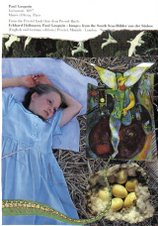
About Me

- Theresa Williams
- Northwest Ohio, United States
- "I was no better than dust, yet you cannot replace me. . . Take the soft dust in your hand--does it stir: does it sing? Has it lips and a heart? Does it open its eyes to the sun? Does it run, does it dream, does it burn with a secret, or tremble In terror of death? Or ache with tremendous decisions?. . ." --Conrad Aiken
Followers
Facebook Badge
Search This Blog
Favorite Lines
My Website
Epistle, by Archibald MacLeish
Visit my Channel at YouTube
Great Artists
www.flickr.com
This is a Flickr badge showing public photos from theresarrt7. Make your own badge here.
Fave Painting: Eden

Fave Painting: The Three Ages of Man and Death

by Albrecht Dürer
From the First Chapter
The Secret of Hurricanes : That article in the Waterville Scout said it was Shake- spearean, all that fatalism that guides the Kennedys' lives. The likelihood of untimely death. Recently, another one died in his prime, John-John in an airplane. Not long before that, Bobby's boy. While playing football at high speeds on snow skis. Those Kennedys take some crazy chances. I prefer my own easy ways. Which isn't to say my life hasn't been Shake-spearean. By the time I was sixteen, my life was like the darkened stage at the end of Hamlet or Macbeth. All littered with corpses and treachery.
My Original Artwork: Triptych
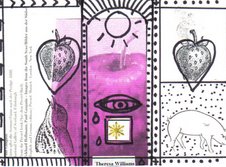
Wishing
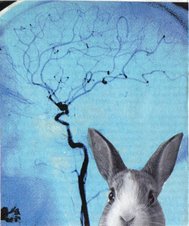
Little Deer
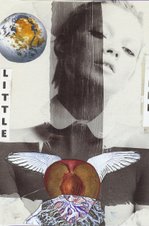
Transformation

Looking Forward, Looking Back
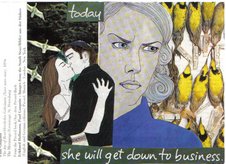
CURRENT MOON
Labels
- adolescence (1)
- Airstream (7)
- Alain de Botton (1)
- all nighters (2)
- Allen (1)
- altars (1)
- Angelus Silesius (2)
- animals (1)
- Annie Dillard (1)
- Antonio Machado (2)
- AOL Redux (1)
- April Fool (1)
- Archibald MacLeish (1)
- arts and crafts (55)
- Auden (1)
- awards (2)
- AWP (2)
- Bach (1)
- Basho (5)
- Beauty and the Beast (1)
- birthdays (1)
- blogs (5)
- boats (2)
- body (2)
- books (7)
- bookstores (1)
- Buddha (1)
- Buddha's Little Instruction Book (2)
- butterfly (4)
- buzzard (2)
- Capote (4)
- Carmel (1)
- Carson McCullers (1)
- cats (15)
- Charles Bukowski (1)
- Charles Simic (2)
- Christina Georgina Rossetti (1)
- church (2)
- confession (1)
- Conrad Aiken (1)
- cooking (5)
- crows (1)
- current events (2)
- D. H. Lawrence (3)
- death (6)
- Delmore Schwartz (4)
- detachment (1)
- dogs (7)
- domestic (3)
- dreams (21)
- Edward Munch (4)
- Edward Thomas (1)
- Eliot (3)
- Eliot's Waste Land (2)
- Emerson (2)
- Emily Dickinson (10)
- ephemera (1)
- Esalen (6)
- essay (3)
- Eugene O'Neill (3)
- Ezra Pound (1)
- F. Scott Fitzgerald (1)
- fairy tales (7)
- Fall (16)
- Famous Quotes (16)
- festivals (2)
- fire (5)
- Floreta (1)
- food (1)
- found notes etc. (1)
- found poem (2)
- fragments (86)
- Frida Kahlo (1)
- frogs-toads (4)
- Georg Trakl (1)
- gifts (1)
- Global Warming (1)
- Gluck (1)
- goats (1)
- Goodwill (1)
- Great lines of poetry (2)
- Haibun (15)
- haibun moleskine journal 2010 (2)
- Haiku (390)
- Hamlet (1)
- Hart Crane (4)
- Hayden Carruth (1)
- Henry Miller (1)
- holiday (12)
- Hyman Sobiloff (1)
- Icarus (1)
- ikkyu (5)
- Imagination (7)
- Ingmar Bergman (1)
- insect (2)
- inspiration (1)
- Issa (5)
- iTunes (1)
- Jack Kerouac (1)
- James Agee (2)
- James Dickey (5)
- James Wright (6)
- John Berryman (3)
- Joseph Campbell Meditation (2)
- journaling (1)
- Jung (1)
- Juniper Tree (1)
- Kafka (1)
- Lao Tzu (1)
- letters (1)
- light (1)
- Lorca (1)
- Lorine Niedecker (2)
- love (3)
- Lucille Clifton (1)
- Marco Polo Quarterly (1)
- Marianne Moore (1)
- Modern Poetry (14)
- moon (6)
- movies (20)
- Muriel Stuart (1)
- muse (3)
- music (8)
- Mystic (1)
- mythology (6)
- nature (3)
- New Yorker (2)
- Nietzsche (1)
- Northfork (2)
- November 12 (1)
- October (6)
- original artwork (21)
- original poem (53)
- Our Dog Buddha (6)
- Our Dog Sweet Pea (7)
- Our Yard (6)
- PAD 2009 (29)
- pad 2010 (30)
- Persephone (1)
- personal story (1)
- philosophy (1)
- Phoku (2)
- photographs (15)
- Picasso (2)
- Pilgrim at Tinker Creek (1)
- Pillow Book (5)
- Pinsky (2)
- plays (1)
- poem (11)
- poet-seeker (9)
- poet-seer (6)
- poetry (55)
- politics (1)
- poppies (2)
- presentations (1)
- Provincetown (51)
- Publications (new and forthcoming) (13)
- rain (4)
- Randall Jarrell (1)
- reading (6)
- recipes (1)
- Reciprocity (1)
- Richard Brautigan (3)
- Richard Wilbur (2)
- Rilke (5)
- river (5)
- river novel (1)
- rivers (12)
- Robert Frost (2)
- Robert Rauschenberg (1)
- Robert Sean Leonard (1)
- Robinson Jeffers (1)
- Rollo May (2)
- Rumi (1)
- Ryokan (1)
- Sexton (1)
- short stories (13)
- skeletons (2)
- sleet (1)
- snake (1)
- Snow (24)
- solitude (1)
- spider (2)
- spring (1)
- Stanley Kunitz (1)
- students (2)
- suffering (4)
- suicide (2)
- summer (20)
- Sylvia Plath (2)
- Talking Writing (1)
- Tao (3)
- teaching (32)
- television (4)
- the artist (2)
- The Bridge (3)
- The Letter Project (4)
- The Shining (1)
- Thelma and Louise (1)
- Theodore Roethke (16)
- Thomas Gospel (1)
- Thomas Hardy (1)
- toys (3)
- Transcendentalism (1)
- Trickster (2)
- Trudell (1)
- Ursula LeGuin (1)
- vacation (10)
- Vermont (6)
- Virginia Woolf (1)
- Vonnegut (2)
- Wallace Stevens (1)
- Walt Whitman (8)
- weather (7)
- website (3)
- what I'm reading (2)
- William Blake (2)
- William Butler Yeats (5)
- wind (3)
- wine (2)
- winter (24)
- wood (3)
- Writing (111)
- Zen (1)





1 comment:
I have been thinking about this and wonder if you believe characters must change in a story. Certainly an epiphany may induce change. Or the epiphany itself could be the change in an otherwise humdrum world. But this assignment makes great sense- in terms of the essential framework and underpinnings of a story. Lucky, lucky students.
Post a Comment